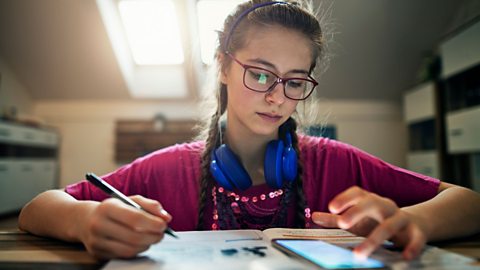There is nothing better than having a good night's sleep… well, maybe devouring a big bowl of chocolate ice cream! But when it comes to studying there really is nothing better than getting some shut-eye to consolidate what we've learned into our long term memory. Chocolate ice cream can't do that!
In this video, learning scientist Dr Carolina Kuepper-Tetzel answers questions about why sleep is so important and how it can help us with our learning. If our video doesn't send you to the land of nod and you're still eager to discover more ways to improve your sleep, then check out our highlights below.
Testimony: Hi, my name is Testimony and I'm always being told I shouldn't stay up on school nights. So today, I'm going to be speaking to learning scientist Dr Carolina to ask why sleep is so important. Hey Carolina.
Carolina: Hello Testimony, nice to meet you. Let's see if I can help you.
Testimony: Yeah, so why is sleep so crucial?
Carolina: So, sleep is important, because on the one hand, it's good for your health, to be re-energised and to have a healthy life. But there's also another thing about sleep, it really helps with your learning. During sleep, two things happen. The first one is, that things that you learn right before you go to sleep are incorporated into long-term memory, so that it gets stuck there and that you are able to remember that information in the long term. And the second thing that happens is, that during sleep you are not interrupted by anything. So you’re not disturbed by anything, there's no interference. So your brain can do its thing to help you remember that information better in the long term.
Testimony: Ah, so I shouldn't pull an all-nighter then?
Carolina: You should not be pulling an all-nighter I’m afraid.
Testimony: My sleep schedule is all over the place, so what… What can I do to make a change?
Carolina: Yeah, we are all guilty of that. I also keep checking my phone constantly in the evening, chatting with my friends and I think students do the same thing and it cuts into the sleeping time. So what you want to do is to get a good sleep hygiene in, so turn off your phone, relax, do something else, for example, read a book right before you go to sleep. One big fear that young people have is the fear of missing out, other people are engaging on social media and you are not because you decided to go to sleep. So one thing you could for example do is talk to your friends and maybe you can schedule sleep time together. So turn off the phones together, put it away, to ‘do not disturb’ and then sleep.
Testimony: Thank you so much for speaking with me today, Carolina.


Get 40 winks
Your parents have probably told you about the benefits of a good night’s sleep a million times, and we don't blame you if you're just a tiny bit sus. But we've asked Dr Carolina who can confirm that a good night's sleep really is important, be sus no more.
As well as helping you regain strength and energy, sleep can actually help you learn better! This is because during sleep, the things you've recently studied get incorporated into your long-term memory, which makes it easier for you to recall the information later on. Whilst you sleep, you are not interrupted by any other information, tasks and distractions. Because of the amazing effect that sleep has on learning, it’s really important not to stay awake all night long studying or to stay up late after you've finished studying in the evening. It's much better to get a good evening routine in place, sleep and let your brain work it's magic. Check out our tips below for creating a relaxing evening routine.
Sleep hygiene
Sleep hygiene is all about putting a routine in place to ensure you have a relaxing evening and a good night's sleep. Why not incorporate some of our tips into your evening?
- If you've made a study plan, try and stick with it – don't add revision sessions too late in the evening as this can be counter productive.
- Plan with your friends to not be online, especially around exam season - that way you won't get FOMO.
- If showering wakes you up, maybe save it for the morning, but if you find it relaxes you and helps you wind down, then it can be a great way to switch off and forget about the rest of the world.


So now you've mastered a couple of effective study techniques to help with your schoolwork, you can combine these with other techniques from the pages below to help you on your way to becoming a study-superstar!

If you need support
You should always tell someone about the things you’re worried about. You can tell a friend, parent, guardian, teacher, or another trusted adult. If you're struggling with your mental health, going to your GP can be a good place to start to find help. Your GP can let you know what support is available to you, suggest different types of treatment and offer regular check-ups to see how you’re doing.
If you’re in need of in-the-moment support you can contact Childline, where you can speak to a counsellor. Their lines are open 24 hours a day, 7 days a week.
There are more links to helpful organisations on BBC Action Line.

Why taking study breaks is a good thing
Dr Carolina Kuepper-Tetzel knows a thing or two about staying focused whilst studying, so she's shared her pearls of wisdom in this article.

What is metacognition and how can it help you?
We've asked developmental psychologist Dr Heather Branigan to explain what metacognition is and how you can use it to help you with your studies.

Why variety might just be the key to study success
Dr Carolina Kuepper-Tetzel explains why it's a good idea to interact with what you're learning in lots of different ways.
